Furious Bockle
"WE WILL DIE DOWN MORE, THAN WE WILL GIVE RUSSIA AND A QUIET DON ..."
BAKLANOV was born 15 March 1809, in the village of Gugninskaya. His father was a simple Cossack, little understanding in literacy, but honest and brave. All his wealth consisted of a wooden house and a few tithes of land. His wife, Ustinya Malakhovna Postovalova, was born in the neighboring stanitsa of Ternovskaya, even poorer and smaller in number than Gugninskaya. She also belonged to a poor Cossack surname, and therefore the family of the Baklanovs lived very poorly.
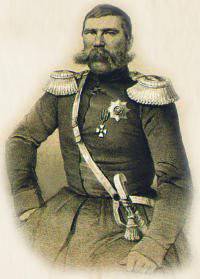 In the years preceding the birth of Yasha, the father served in the working regiment of the "Kochurov" (it was a kind of Cossack construction battalion, engaged in the construction of Novocherkassk and earthworks in the territory of the Don Army). He was even obliged to appear at the service not with a checker, but with a "swing" - a single-wheelbarrow for transporting land and other materials. Thus, the daily bread of the future hero of the Caucasus earned by heavy physical labor. However, being endowed, as the 19th century historian V. Potto writes about him, "with the happiest heroic appearance and intelligence," he was "noticed by the authorities" and in 1808, made a cornet. This first officer's rank then immediately gave the rights of hereditary nobility, and therefore Yakov, who was born from birth, was considered a nobleman.
In the years preceding the birth of Yasha, the father served in the working regiment of the "Kochurov" (it was a kind of Cossack construction battalion, engaged in the construction of Novocherkassk and earthworks in the territory of the Don Army). He was even obliged to appear at the service not with a checker, but with a "swing" - a single-wheelbarrow for transporting land and other materials. Thus, the daily bread of the future hero of the Caucasus earned by heavy physical labor. However, being endowed, as the 19th century historian V. Potto writes about him, "with the happiest heroic appearance and intelligence," he was "noticed by the authorities" and in 1808, made a cornet. This first officer's rank then immediately gave the rights of hereditary nobility, and therefore Yakov, who was born from birth, was considered a nobleman. 1812 has come the year. Although Yasha Baklanov was only three years old, but he was firmly remembered in memory of the events of that momentous time. Then the messengers sent by the ataman Platov from the active army, toured all the stanitsas, informing him that Napoleon, who came with countless hordes to ruin Russia, boasts to go to the very banks of the cherished Don. "If the enemy defiles the Cossack land with its presence," the heralds proclaimed, "then he will not spare either his wives or children, scold the temples of the Lord, will disturb our fathers’s ashes and mix hot Cossack blood with the waves of the Quiet Don ... Ataman calls all faithful Donians to defend the king and fatherland! "
"We will rather die than give Russia and the Quiet Don a reproach to the nasty French!" - Cossacks unanimously answered their chieftain. According to his order, in a few weeks 20 Cossack volunteer regiments were formed, which arrived in the fall in the camp of the Russian army near Tarutino. Nobody expected them there, except for Platov, who acted secretly in this case, and therefore the delight and amazement of all were such that they caused tears of emotion even from Kutuzov himself.
With his regiment he left to expel the French from the Russian land and father Yasha. Therefore, the boy grew up left on his own, on the street, like the children of other villagers. When Yakov was five years old, his grandmother gave him "to science" to an old woman named Kudimovna. Then he fell into the hands of the parish priest, and then the stanitsa of the sexton and studied with them, like most of his peers, the psalter and the chapters.
The boy was 6 years old when his father returned from foreign campaigns, having fought the whole of Europe. He was already an есsauul, with the Anninsky Cross on the hilt of drafts and three cruel wounds, and gained a reputation as one of the bravest Cossack officers.
Until the end of his days, Yakov Petrovich remembered this meeting, and he told about them in the “Memories” written already at rest in Petersburg. The whole village came out then to greet the soldiers returning with glory. The old men, veterans of the Suvorov campaigns, were baptized fervently and, crouching to the ground, happily exclaimed: "Yes, our Cossacks served God, the sovereign and the Great Don Army!"
A year later, Yasha went with his father to meet Ataman Platov, who had returned to Don, who had been sought by the extraordinary mercies of all the allied monarchs. In reciprocal greetings, in the living manifestation of ancient Cossack customs, in the very setting of the meeting, "so much genuine and sincere Cossack poetry sounded," wrote in "Memoirs" of Cormorants, - that these minutes decided the fate of my life ... "
"ONE TIME BORN MATI, ONCE AND DIE ..."
FATHER stayed home for long. Returning to Don in 1815, the following year he was already leaving for Bessarabia, from where there was a plague on Russia. In order to prevent the penetration of the terrible contagion into the Russian borders, the Don regiments were cordoned off, blocking all the routes from the south. The senior cormorants decided to take his son with him - let him now learn from the regimental clerks, and at the same time learn the basics of military craft. So already in childhood, Jacob met the first serious danger and learned to despise it, because he saw around him such utter indifference to life, which could only come from people who, deeply before fatalism, believed in the meaning of the utterance "What is to be done" . “Once I gave birth to my mother, once and to die,” the Cossacks of the twelfth year argued, and this saying was the motto of Yakov Petrovich’s life.
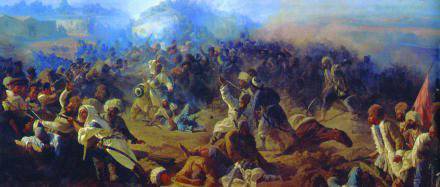 His favorite occupation in the months spent in the cordon was to sit in the hut with experienced Cossacks and eagerly listen to their stories about military exploits: how the warriors used to go to the “Tour Saltan” once, as the current interlocutors fought off victories over the great army of Bonaparte. The latest events particularly excited the boy's imagination. The Dontsi had something to boast of: during the Patriotic War of 1812, the Cossacks exterminated the French to 18500, captured 10 generals, 1050 officers, 39500 lower ranks, captured 15 banners and 346 guns. Yasha especially liked to hear about the heroism of his father, about how, in 1814, a German general even appointed him, much to the pride of all Cossack patrols, as commandant of the small French fortress Sasfogent. And the boy's heart caught fire, and dreamed of him about such great feats, about foul glory ...
His favorite occupation in the months spent in the cordon was to sit in the hut with experienced Cossacks and eagerly listen to their stories about military exploits: how the warriors used to go to the “Tour Saltan” once, as the current interlocutors fought off victories over the great army of Bonaparte. The latest events particularly excited the boy's imagination. The Dontsi had something to boast of: during the Patriotic War of 1812, the Cossacks exterminated the French to 18500, captured 10 generals, 1050 officers, 39500 lower ranks, captured 15 banners and 346 guns. Yasha especially liked to hear about the heroism of his father, about how, in 1814, a German general even appointed him, much to the pride of all Cossack patrols, as commandant of the small French fortress Sasfogent. And the boy's heart caught fire, and dreamed of him about such great feats, about foul glory ... Returning with his father from Bessarabia to Don, Jacob finally left the primer and began to do housework: he plowed land with the priest, mowed the hay and grazed the herds, where, by the way, he learned to ride unbroken steppe horses. He rode on horseback since 3 years, and when he grew up, his favorite pastime was to go hunting or war games on Sundays, where Cossack youth practiced jigging, shot at a goal, competed in a fight and fist fight.
The hunt, or, as the Don people called it, "gulba," then had a special significance for the development of military skills and character traits of the Cossack. She developed not only the ability to shoot and prick, but also sharpness, prowess, caution, military cunning, a good eye, and brave determination. In those years, in the Don steppes, not only foxes, deer, wolves, bears, but even snow leopards and wild boar came from the Zuban forest. The Cossack was supposed to overtake the beast on horseback and lay it in place with a deft dart strike. They shot only large predators, and the shot had to go out alone and deadly, otherwise the life of the hunter himself was in grave danger - to retreat from the hunt, even from the enraged beast, was considered shameful.
Storming of Varna by Russian troops
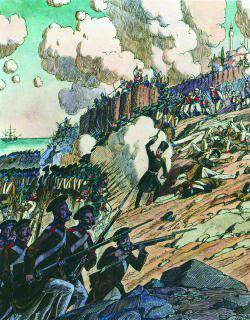 Jacob Baklanov became an avid hunter and a great shooter. He got into a bet on aces at extreme distances, and he put a bullet in a bullet - no matter if he was holding a pistol, a fitting (rifled carbine) or a hunting double-barreled gun.
Jacob Baklanov became an avid hunter and a great shooter. He got into a bet on aces at extreme distances, and he put a bullet in a bullet - no matter if he was holding a pistol, a fitting (rifled carbine) or a hunting double-barreled gun. Sniper accuracy in shooting came to him, it seems, with genes: even his grandfather was nicknamed the Circassians "Shaitan-Djegeni" (using the devil's help) because, once faced with a lot of jigits of Prince Konakov, in the desert steppe, in a predatory raid on the Russian stanitsa, he not only left them in a furious multi-fierce jump, but also galloped off at a gallop with shots from his rifle, one after another, of his seven pursuers - exactly as many bullets were with him. And all seven went to the next world with a bullet hole exactly between the eyes. After this unfortunate chase, Prince Konakov turned to his native villages, concluding that Allah had turned away from him, if he had sent such a dangerous enemy, even if alone ... The memory of this case lived among the Circassians for a long time.
He knew about the amazing feat of his grandfather and his grandson Jacob. And in no way inferior to his famous ancestor: neither the heroic appearance, nor physical strength, nor strength of spirit. From an early age he excelled in all military amusements. No one in the stanitsa shot him better, no one, bragging about his horse's dressage, couldn’t make him so boldly as Cormorants, to pass on shortened reins between two blazing fires or jump over the fire spread out in the field. And how many times he became the winner in competitions between the best fighters or fist fighters and took for it the award from the hands of pretty Cossacks - the foot of his native Tsymlyansky, and even a strong honey honey!
20 May 1824, 16-year-old Baklanov was enlisted as a sergeant in the Cossack regiment Popov. A year later, together with his father, who commanded a hundred in the same regiment, he went to the Crimea.
However, his military service was interrupted after a few months in unexpected ways. Once, when, according to the memoirs of Yakov Petrovich, he was on duty for a hundred, he had to compile some kind of report himself, not God knows how important. And then it turned out that this young Cossack did not know how. The illiteracy of his son, which was discovered, so much struck his father that, with the consent of his superiors, he immediately sent him to Feodosiya, so that he would at least learn a little from the local college there.
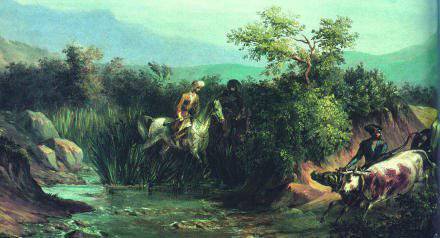 But here, too, Yakov did not stay long — his mother, who did not have time to manage the household, insisted in letters that his father, along with his son, should come home and marry him on an elected bride. Therefore, at the beginning of 1826, the Baklanovs went on vacation to the Don. On January 19, Jacob was married to the daughter of a Gugnin priest, Serafim Anisimova. After spending a short time with his young wife, he soon returned to the regiment.
But here, too, Yakov did not stay long — his mother, who did not have time to manage the household, insisted in letters that his father, along with his son, should come home and marry him on an elected bride. Therefore, at the beginning of 1826, the Baklanovs went on vacation to the Don. On January 19, Jacob was married to the daughter of a Gugnin priest, Serafim Anisimova. After spending a short time with his young wife, he soon returned to the regiment.FATHER NAGAYKA AS A MEDICATION FROM FAILURE
29 APRIL 1828 of the year for the length of service Baklanov Jr. received the rank of cornet.
Meanwhile, Russia entered the war with Turkey. By that time, his father became the regiment commander instead of the deceased Popov. With the beginning of hostilities, its part was moved to the borders of European Turkey. When Baklanov Sr. needed a messenger to hand over the dispatch to Grand Duke Mikhail Pavlovich, who was besieging Brailov, he discharged his son.
Having jumped under the walls of a strongly fortified Ottoman fortress and having learned that the troops were preparing for an assault, Jacob immediately volunteered to participate in this matter and was assigned to the hunters, who had to go ahead of the assault columns.
Banman's Banner
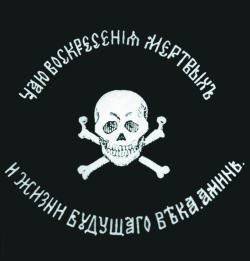 Storm failed. But the young volunteer did not see what was happening under the fortress walls: in the first minutes of the attack, a shell exploded next to it. Baklanov threw a blast wave in the air. Having flown several meters, he fell to the ground, stunned. Fortunately, the cornet got off with only bruises. This contusion saved his life because the remaining hunters who had survived artillery fire died when they were met by a janissary sortie. Only the non-commissioned officer escaped, rushed into the Danube and swum to his.
Storm failed. But the young volunteer did not see what was happening under the fortress walls: in the first minutes of the attack, a shell exploded next to it. Baklanov threw a blast wave in the air. Having flown several meters, he fell to the ground, stunned. Fortunately, the cornet got off with only bruises. This contusion saved his life because the remaining hunters who had survived artillery fire died when they were met by a janissary sortie. Only the non-commissioned officer escaped, rushed into the Danube and swum to his. Having appeared in the regiment after being discharged from the hospital, Jacob first of all told his father about his courage, hoping to hear praise. “Instead of praise, my father beat me with a whip,” he later recalled, saying, “Do not put your head in the pool when you are far from your unit, and go with it into fire and water.”
And another time he had to try his father's whip under similar circumstances. And that's what happened. Khorunzhy Baklanov was transferred (it is not clear for what reason) for some time in the Don artillery. When his battery was under Shumla, he learned that his father’s regiment was located nearby, and went to visit the priest. On the way, Jacob heard a strong firefight at the outposts. The Cossack met and explained that the Turks made a sortie and the regimental commander (his father) and a hundred on duty went to the field. Wanting to look at the exchange of fire, the young officer left the camp and stopped on a small hill, not far from the chain, where a handful of Cossack officers were already standing. From here there was a view of the valley, which was full of ours and Turkish riders. Cossack lava (about 3 hundreds) was fired from the Turks, then stepping on them, then moving back in order to ambush. The Turks acted in a similar way: they desperately threw themselves at the Cossacks and, discharging their long pistols into the white light, like a whirlwind were carried back. Lowering the reins, Baklanov completely indulged in the contemplation of this new picture for him, when suddenly the voices of the officers who were talking behind him made him start. The conversation was about him. Some Cossack commander with a malice in his voice informed his comrade that he was the son of a regimental commander who served in artillery, and here he turned, right, then, to get a rank or a cross, after looking at the firefight ...
Medal "Jacob Cormorants"
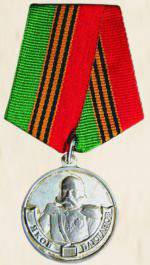 Hearing these words, Baklanov remained motionless for a minute, not knowing what to decide and how to respond to such an insult he did not deserve. The blood hit him in the head, and he turned in the saddle, putting his hand on the hilt of his checkers. The talkative officer, who realized what kind of reaction the ill-considered words that had flown from his language, caused him, hastened to hide behind the backs of his comrades. So without seeing whom to demand satisfaction, Yakov Petrovich remained thoughtful for a few moments. From the experienced resentment, he unimaginably wanted to accomplish some desperately brave feat. Under the influence of this mood, he mechanically squeezed the knees of the side of his stallion, henched and, releasing the reins, waved a heavy Kalmyk whip.
Hearing these words, Baklanov remained motionless for a minute, not knowing what to decide and how to respond to such an insult he did not deserve. The blood hit him in the head, and he turned in the saddle, putting his hand on the hilt of his checkers. The talkative officer, who realized what kind of reaction the ill-considered words that had flown from his language, caused him, hastened to hide behind the backs of his comrades. So without seeing whom to demand satisfaction, Yakov Petrovich remained thoughtful for a few moments. From the experienced resentment, he unimaginably wanted to accomplish some desperately brave feat. Under the influence of this mood, he mechanically squeezed the knees of the side of his stallion, henched and, releasing the reins, waved a heavy Kalmyk whip. The standing horse of him stood on its hind legs and from the quarry flew an arrow directly at the enemy. Our flankers frightened rushed to the side, giving way. The cornet in proud solitude rushed across the open field, where both Russian and Turkish bullets began to whistle by its ears. Recovering, he tried to stop the horse. But it was all in vain. An angry stallion, biting the bit and not listening to the bridle or the rider's voice, rushed him further and further. Soon he reached the Turkish chain. A handful of enemy horsemen, who had stepped in on the road, instinctively parted in front of a furiously galloping Cossack. Rushing past them, Baklanov rounded the formation of Turkish reserves on the edge of a steep cliff and was taken to the old road.
Behind him rushed in pursuit, taking a long spear at the ready with a dozen Ottoman delibashas. Yakov Petrovich had no opportunity to get away from them on a tired horse. The distance between him and the catching-up enemies quickly decreased. Already two Ottomans in high motley turbans galloped him to the right and left. Corners heard their breathing horses breathing heavily, saw how their thin rush stings flashed, slipped almost at his very chest ... Gathering his last strength, he loudly shouted for help ... "I didn’t remember anything further," he told years later, Baklanov. ”As if in a dream I heard the voice of my father, gunshots and fierce cries of the fighting Cossacks and Turks. I woke up already in the tent, near my father, who was very angry at my folly, but of course I carefully hid from him what was the cause of the whole incident. "
7 July 1828, the cornet Baklanov distinguished himself when crossing the Kamchik River, leading a party of hunters that, under heavy gunfire, the Turks crossed the water barrier by swimming and seized the bridge. The corps commander personally thanked the young officer for his bravery. But from his father he again got a few blows with a whip - for, according to Baklanov, "that he allowed himself to swim by swimming on a crow, and not on a white horse, which was stronger and safer, while on a crow he could drown."
In the subsequent battles, the Cossack regiment of Baklanov clashed with the Turkish cavalry in a field under the Burgas fortress, overturned it in a furious section, and on the shoulders of the fleeing enemy broke through the fortress walls. The son of the regimental commander, who this time was on the edge of the attack, almost died in a hot fight, a horse was killed under him.
The huge food reserves of the Ottoman army were concentrated in Burgas; their loss meant for the sultan's army in fact the loss of the entire campaign. It was not by chance that the regiment of Baklanov was awarded the banner of St. George for this success. And Yakov Petrovich for the valor shown in the Turkish war, was awarded the Order of St. Anne of the IV and III degree.
"THANK YOU TO THE DOG AND THE MOUNTAINS. THEY LEARNED ME A LOT ..."
In 1834, with the Don Cossack regiment of Zhirov, Jacob Baklanov first entered the Caucasian War, in the forces of the left flank of the Kuban line, under the command of Major General Baron G. Kh. Zass. It was a time when Grigory Khristoforovich went on the offensive from the defense, moved his regiments across the Kuban and carried out a number of successful expeditions against the warlike tribes of the Besleneevtsy, Abadzekhs, Kabardians and others who lived between the Kuban and Laba rivers.
Order of St. George
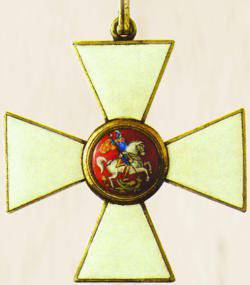 Here, Baklanov first learned what war in the Caucasus is. This science was expensive for him. “Thanks to Sass and the Highlanders,” said Yakov Petrovich. “They taught me a lot ...”
Here, Baklanov first learned what war in the Caucasus is. This science was expensive for him. “Thanks to Sass and the Highlanders,” said Yakov Petrovich. “They taught me a lot ...” The personality and exploits of Baron Sasse are so interesting that they deserve a separate story. And now, only to let the reader understand how fortunate the teacher sent Baklanov to fate, we will give an opinion about this Baltic German Decembrist A. Rosen, who knew the Caucasian life well: "None of the leaders of the Russian army was afraid of the Circassians and none of them used so famous among the mountaineers as this original Kurmanian. His military cunning was as remarkable and worthy of astonishment as his fearlessness, and he also showed an extraordinary ability to study the character of the Caucasian peoples ".
The first time Baklanov attracted the attention of General Sass on the June 1836 expedition of the year, when the Kuban line troops marched to capture hostile villages between the Psefir, Laba and Belaya rivers.
... The flying squad of Cossacks and dragoons approached one of the villages even after dark, two hours before dawn. Summoning the hunters, Zass ordered them to crawl secretly under the very walls of the village and, on a signal, try to seize the exit gates or at least scatter the fence to open the free passage of cavalry. To command the hunters was entrusted to Baklanov. When his group got close to the aul and began to grow light, the Cossacks were convinced that the wattle around the whole village were double, covered to the brim with earth and stones, so that they would have to be scattered until the evening; the gates were alone, and, moreover, oak, locked with thick iron bars. Not knowing what to decide, Yakov Petrovich with two plasters once again walked around the whole aul and here, after a careful examination of the wall, he saw that there was a small loophole above the exit gate, apparently made for the walkers. Through this gap it was possible to get inside the village itself. Therefore, as soon as the signal rocket leaped up, Baklanov rushed right here, trying to climb the steep and crumbling embankment as soon as possible. Cossacks rushed for him. Baklanov had almost reached his goal, when suddenly the mountaineer, who was standing on the viewing platform above the gate, fired a rifle at him. Fortunately, there was a misfire. Cossack officer deftly dodged the pistol bullet and jumped on the gate. From the bolts that had to be opened, it was separated only a few fathoms. But then the mountaineer, who had recoiled back after his miss, grabbed a pistol by the barrel and hit Baklanov with his massive handle straight in the forehead. Yakov Petrovich fell into the ditch with a fractured skull like a dead man. “I don’t know how long I lay without memory,” he recalled, “but when I came to my senses, the Cossacks were already in the village, breaking their wattle and knocking down the gate. I didn’t receive a cross or a rank for it, but I was awarded more attention than me Sasse, who from that time began to show me signs of his special disposition. "
Golden, with precious ornaments weapon with the inscription: “In memory of the conquest of the Caucasus”
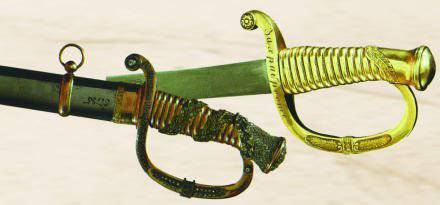 The science of Sasse and the experience of almost daily skirmishes with the mountaineers were soon made an excellent military commander out of a young Caucasian officer. This was facilitated by the fact that Baklanov had a rare intuition, which allowed him to correctly guess the critical moment of the battle and make the right decisions.
The science of Sasse and the experience of almost daily skirmishes with the mountaineers were soon made an excellent military commander out of a young Caucasian officer. This was facilitated by the fact that Baklanov had a rare intuition, which allowed him to correctly guess the critical moment of the battle and make the right decisions. Indicative in this respect is the fight 4 July 1836 of the year. It began with a miss by Yakov Petrovich, who was fascinated by the pursuit of the party of the Circassians and unexpectedly found himself in front of a person three times as great as the enemy. Having repulsed the 12 attacks of the enemy in succession and not seeing any help, the Cossacks were already preparing for death. But Baklanov managed to reverse the course of events in his favor, having resorted to a rather cunning psychological method: when a sudden rain poured out and thunder rumbled, resembling cannon shots, he shouted to the Cossacks that this was going for help, and at the head of fifty Dontsov crashed peaks into the thick of the starting line after the next attack of the Circassians. They flinched in surprise, and then the second Cossack fifty hit him on the flank. The Circassians fled in disarray, covering the battlefield with the bodies of the dead. For this feat, Zass, who especially appreciated the bold men, awarded Baklanov with the Order of Saint Vladimir of the 4th degree with a bow and began to trust him with particularly difficult and dangerous tasks.
"THAT THE KAZAKAK MEANS MORE THAN ONE ONLY BRAVE"
In the 1837 year, the regiment of Baklanov, after serving his term in the Caucasus, returned to the Don. Yakov Petrovich was assigned to the training regiment that had just been assembled in Novocherkassk, where the Cossacks were to study the new charter, improve the combat skills. The service in this regiment brought a lot of benefits to the Caucasian hero. Then he had the opportunity to visit Poland, and in 1845 year - to return to the Caucasus, already with the rank of troop commander.
Suppression of the Polish uprising 1863-1864
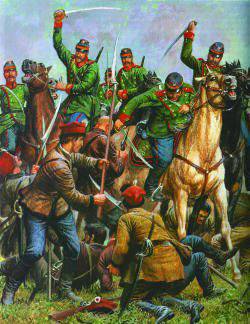 He was assigned to the twentieth Cossack regiment, standing on the left flank of the Caucasian line in a small fortification of the Kura. The following year, he took this team under his command, with the light hand of the viceroy and commander-in-chief of the Separate Caucasian Corps, Prince Semyon Vorontsov, having attracted him with his courage and energy in the operation to rescue the trapped mountain mountaineers who committed the notorious Dargin 1845 expedition of the year ("Brother "previously told about these events).
He was assigned to the twentieth Cossack regiment, standing on the left flank of the Caucasian line in a small fortification of the Kura. The following year, he took this team under his command, with the light hand of the viceroy and commander-in-chief of the Separate Caucasian Corps, Prince Semyon Vorontsov, having attracted him with his courage and energy in the operation to rescue the trapped mountain mountaineers who committed the notorious Dargin 1845 expedition of the year ("Brother "previously told about these events). It should be noted that the Don Cossacks, in contrast to the linear (that is, local, who lived all their lives in the Caucasus), then had a bad reputation in combat. Growing up among the expanses of the steppe, they were very difficult to get used to the mountain conditions that were alien to them, were exposed to mass diseases resulting from an unfamiliar climate, died in vain, unable to withstand the sudden attacks of the highlanders. The prolonged bloody war far from home, in the mountains, was perceived by most of the Donts as God's punishment for some unknown sins to them. The fact that the Caucasian authorities generously distributed Cossacks to staff officers and officials of all ranks as orderlies, grooms, orderkeepers, vestists ... did not add to her popularity ...
Therefore, Baklanov began to turn his regiment into a thunderstorm for Circassians and Chechens from bringing all of his Cossacks back into service, not even considering the exhortations of high-ranking officials, who were sorry to lose free servants. Then he dressed the regiment. Uniform uniforms and trousers were hidden in chests for parades and parades. Each Cossack had to get himself a comfortable Circassian. At first they were simply removed from the killed enemies, and then they began to sew to order. Cossacks also had Circassian damask checkers and daggers, English rifled fittings, which overseas well-wishers supplied the fighting mountaineers in abundance.
Caucasian jigit. Photo of the late XIX century
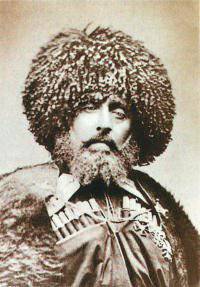 And the horses in the Baklanov regiment were different - not thin and frozen, with drunk oats and not knowing cleansing, but well-groomed, well-fed, smooth. To impose strict order in the maintenance of the horse composition, Baklanov behaved coolly. As eyewitnesses told, he several times stole oats of his subordinates subjected him to the most severe flogging, and soon the horses in his regiment changed beyond recognition, after which the Cossacks were hardy Circassian horses.
And the horses in the Baklanov regiment were different - not thin and frozen, with drunk oats and not knowing cleansing, but well-groomed, well-fed, smooth. To impose strict order in the maintenance of the horse composition, Baklanov behaved coolly. As eyewitnesses told, he several times stole oats of his subordinates subjected him to the most severe flogging, and soon the horses in his regiment changed beyond recognition, after which the Cossacks were hardy Circassian horses. But it was also necessary to train the regiment in the war in the mountains. Baklanov began by arranging evening conversations with officers.
“About the courage of the Cossack,” Yakov Petrovich used to say in these conversations, “there is no need to take care, because the Don Cossack cannot but be brave, but the Cossack needs to understand something and more than courage alone.”
And he tirelessly taught the Cossacks intelligence service, demining and artillery case. To make it easier to do this, he neglected the letter of the charter and formed a special seventh hundred, a training one. In it, under his close supervision, constables (junior commanders) were trained for the whole regiment. In the battles she served as avant-garde or a reliable reserve.
In each hundred, one platoon was equipped with an entrenching tool, and his men were specially trained in the demining business. There was also a Plastunian team of the best archers and riders used for the most dangerous reconnaissance operations. And the rocket battery of the regiment under Baklanov became exemplary in the Caucasus. From a useless burden, the rockets filled with gunpowder and bullets turned into a powerful weapon, effectively operating where guns could not pass.
No one in his regiment dared to leave the ranks during the battle; the lightly wounded were to remain in the front; those who lost a horse should have fought until they got a new one.
“Show your enemies,” said Baklanov, “that your thought is not about life, but about the glory and honor of the Don Cossacks!”
Possessing amazing physical strength, iron health and tireless energy, Yakov Petrovich, according to Potto, could not remain inactive even for the shortest time. Do not sleep a few nights, roving with plasters through impassable thickets, meant nothing to him. He personally drove patrols and taught his Donians to conduct observation and reconnaissance in an unusual mountainous country. Gradually, the Baklanov warriors were drawn into the difficult Caucasian service, acquired practical skills, and accustomed to vigilance.
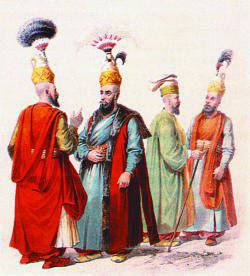 All this came, of course, not suddenly, but gradually, through everyday practical lessons, in which Yakov Petrovich showed himself to be a wise and strict teacher. He possessed an extraordinary ability to recognize the presence of the enemy, even by petty signs, and stubbornly taught the Cossacks this.
All this came, of course, not suddenly, but gradually, through everyday practical lessons, in which Yakov Petrovich showed himself to be a wise and strict teacher. He possessed an extraordinary ability to recognize the presence of the enemy, even by petty signs, and stubbornly taught the Cossacks this. Having spies of local residents, of which Ali Bay and Ibrahim are the most famous, Baklanov always flew off the enemy, appeared like a lot of snow. Soon the name of the terrible Boklya, as the highlanders Yakov Petrovich called, became scary for all of Chechnya. And Don darts they no longer called contempt reed. “Dajjal”, which means - the devil - that’s what the Chechens called Baklanov called. They had more than once the opportunity to make sure that neither the bullet nor the saber take it.
... 5 December 1848, the garrison of the Kura fort, where the Tengin infantry and 20 Don Cossack regiments were stationed, was alarmed. The mountaineers attacked the battalion of the Tenginsky regiment, which was engaged in cutting wood in the forest. As soon as the first shot thundered, the Baklanov hundreds already rushed into battle. Chechens were in a hurry to retreat. The chase began, in which one Cossack was captured by Chechens and two fell down, shot through with bullets. Baklanov himself was wounded. He suddenly reeled in the saddle and released the reins. The Cossacks wanted to catch him, but he shifted the reins to his other hand, shouted: "Forward" - and rushed to give orders. A bullet broke into his left collarbone. The blood flowed through the sleeve of the yellow Circassian and dyed it. But the cormorants, overcoming a terrible pain, continued to dispose of in battle. Only when everything was over and the Cossacks removed the weapons from the killed people, Cormorants lay down on the burka, and the Cossack tied his hand to him with a handkerchief ...
In APRIL, 1850 was to be replaced by Don regiments located in the Caucasus. The Don Cossack 20 th regiment had to go home, and with it its commander, the terrible Boklya. But Baklanov was so needed in the Caucasus, without him the Caucasian regiments would be so orphaned that Prince Vorontsov wrote to the Minister of War Count A. I. Chernyshev: "Report to the Emperor that I beg Him to leave us to Baklanov ... This man is dear to us for his outstanding bravery, his knowledgeable mind, for military abilities, knowledge of places and the fear that he instilled in the enemy ... "This request was fulfilled, and Baklanov remained on the front line, having received the Don Cossack 17 regiment for its beginnings. Five hundred commanders and an adjutant, as well as several ordinary Cossacks, voluntarily remained with him.
It was a touching way for Baklanov to say goodbye to the twentieth regiment fostered by him. When he went to the regiment - all these iron bogatyrs, hung with crosses, wept from right to left flank, like little children. The terrible Dajjal's heart sank, he turned away, waved his hand, and silently left the fortification gate. His hundreds were pulled after him. He escorted them to the Karasinsky post, and there he parted ways with his comrades.
"THE TEA OF THE RESURRECTION OF THE DEAD AND LIFE OF THE FUTURE AGE"
AT THE BEGINNING 1851 of the year, to Kurinskoe, with the mail wagon train Baklanov who arrived there, it was not known from whom and where the package came from. They unfolded it, and there was a black badge in it, on which Adam's head was embroidered with two crossed bones under it and a circular inscription: "I am looking at the resurrection of the dead and the life of the next century. Amen." When this badge first appeared in front of the regiment, the Cossacks were confused by its sad look, which brought gloomy thoughts about death. But when the Cossacks saw that this black badge terrified the Chechens, they loved him. Baklanov did not part with him until the end of his life.
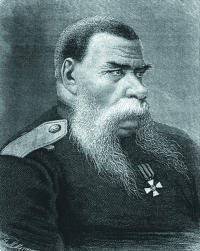 Defeated on all sides by our troops, the Chechens decided on a desperate enterprise. They conceived to attack the Kur Fortification. On the day of the Assumption of the Virgin was especially hot and stuffy. After dinner, cormorants lay down to rest in his house on the highland carpet. The heat overcame him. He completely undressed, took off even his shirt and remained in the same man. Suddenly there was a cannon shot quite close, the windows in the room where Baklanov slept rang out, and a confused orderly flew in to him.
Defeated on all sides by our troops, the Chechens decided on a desperate enterprise. They conceived to attack the Kur Fortification. On the day of the Assumption of the Virgin was especially hot and stuffy. After dinner, cormorants lay down to rest in his house on the highland carpet. The heat overcame him. He completely undressed, took off even his shirt and remained in the same man. Suddenly there was a cannon shot quite close, the windows in the room where Baklanov slept rang out, and a confused orderly flew in to him. “Chechens on the outskirts,” he shouted.
Shots became frequent; the noise, the shouts, the jump and the commotion on the street showed that it was a serious matter. Baklanov awake, as he was without clothes, rushed to the door, snatched a piece from the hands of the orderly, put it on his naked body, threw some kind of burka and appeared in this form before the Cossacks. Two hundred, gathered in alarm, rushed after him. As soon as the Cossacks came out of the fortification, they saw a man up to eight hundred Chechens on horseback descending from the mountains. Cossacks hesitated. But Baklanov snatched the pick from the hands of his orderly, shouted: "Forward!" - and rushed to the melee. The Cossacks did not lag behind their commander, and a handful of them crashed into the crowd of enemy cavalry. Working with whips, Cormorants, like a fabulous hero, poured around the crowd of the enemy. The mountaineers, who trembled at first, could not recover and soon fled.
The Cossacks took the prisoners, and the prisoners were convinced that the terrible Cormorants, if not a real Dajjal, then probably already akin to him.
Soon the highlanders had to finally make sure that the formidable Boklya was indeed a real devil. One evening, a large society gathered around Baklanov. There were many officers of the Russian regiments, drinking tea, playing cards, talking. It was already ten years old when an orderly came to Baklanov and reported that a spy wanted to see him.
- Which the? - asked Cormorants.
“Ali Bey,” the orderly replied.
- Ask here.
Quietly, the mountaineer Baklanov passed by inaudible steps and began to report in a mysterious whisper:
- Shamil, the formidable leader of the Chechens, learned that the clearing on the river Michika is over by the Russians. He was told that the Chechens could not stop you, and here he is ... I am afraid to say, Mr Colonel.
- Well! - Baklanov encouraged him.
- Shamil then called the shooter out of the mountains, and the shooter on the Koran vowed to kill you. The shooter came to our village. He boasted a lot. He says that he breaks a hen's egg thrown up fifty steps away. Well, only our old men tell him that they saw how you kill a fly with a hundred and fifty steps. "Look, Janem," our old men say to him, "if you miss, Boklya will put you in place."
- Well, what about the mountaineer? - Ali Bey asked the officers.
“Nothing,” answered the Chechen, “turned a little pale, but soon recovered. I, he says, only once in my life gave a miss, and even then I was only seven years old. I, he says, swore on the Koran. Tomorrow he will sit down on the battery across the river and wait for you, ”said Ali-bey to Baklanov. “You're not going to the mound tomorrow,” he added.
“Okay,” said Baklanov, generously rewarded the Chechen and let him go.
The next day, at the usual time, the troops left the Kura fortification. Cormorants, having crossed the Michik river, stopped the convoy a little earlier than usual, and accompanied by one orderly went to the battery, where the famous shooter Janem was waiting for him. Rising to the hillock, Baklanov took the gun from the hands of the orderly and, leaving the Cossack, one went to the battery, stopped the horse and began to peer into the bushes. And here he saw among the leaves a black hat of a Chechen, and at that very moment the barrel of the gun flashed and a shot rang out. God saved Baklanov. Janie missed the second time in his life; the bullet only slightly touched the edge of the Baklanov's sheepskin coat. The Chechen rose to his belt and, with horror, saw that the Cormorants, whole and unharmed, was riding a horse. The Chechen ducked behind the shaft and began to re-charge the rifle. But his hands were shaking, and he fussed himself, and Baklanov realized that the second shot could not be true. Then Baklanov took his leg out of the stirrup, put it on the horse's neck, leaned on it with his hand and prepared his gun. There was a shot. The Chechen again missed, and as soon as he leaned out a little, Baklanov pulled the trigger, and the Chechen fell backwards: a bullet hit him between his eyebrows and went through his head.
Both ours and Chechens closely watched this contest, and when Baklanov slowly went to his own, our troops greeted him with a loud “Hurray!”, And the Chechens, waving their papakhs, jumped into the rubble and shouted: “Yakshi, Boklya! Bravo, Boklya! Well done, Bockle! "
And long after that in Chechnya they said: "Would you like to kill Baklanov?" - and stopped by this question boasting shooters.
30 December 1852, the Baklanov received the Order of St. George, IV degree, which he had long deserved.
In the 1855 year, already in the rank of Major General, Baklanov participated with the Cossacks in the exploration of approaches to Kars and in the storming of Kars. On November 16 of this year, Kars was taken, and shortly thereafter, the Cormorants was assigned to Kutaisi. The then governor-general of the Caucasus, General Muravyov, appointed him in Kutaisi.
Monument at the tomb of Baklanov in St. Petersburg
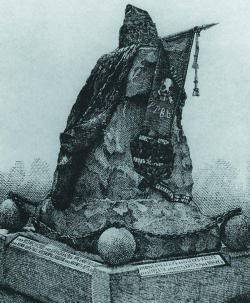 But Baklanov did not have to be in Kutaisi, he had to go to the Don, and from there he was soon assigned to Poland to command the Cossack regiments assembled there to pacify the rebellious Poles. There, General Baklanov ruled for some time the August Province. But the iron health of Baklanov was shaken. Although he was only 55 years old, the years of his life were lived during constant campaigns and alarms. Cormorants asked for leave on leave for Don. But on Don, he contracted pneumonia. Bent over, he returned to Vilna and continued to command until the 1867, Don regiments located in Poland. Enrolled this year by the Don Army, Baklanov, he spent the rest of his life in St. Petersburg.
But Baklanov did not have to be in Kutaisi, he had to go to the Don, and from there he was soon assigned to Poland to command the Cossack regiments assembled there to pacify the rebellious Poles. There, General Baklanov ruled for some time the August Province. But the iron health of Baklanov was shaken. Although he was only 55 years old, the years of his life were lived during constant campaigns and alarms. Cormorants asked for leave on leave for Don. But on Don, he contracted pneumonia. Bent over, he returned to Vilna and continued to command until the 1867, Don regiments located in Poland. Enrolled this year by the Don Army, Baklanov, he spent the rest of his life in St. Petersburg. 18 January 1873, the Cossack Bogatyr did not become. He was buried in St. Petersburg in the Novodevichy Convent, and there his friends erected a monument over the grave.
A Caucasian burqa and a don hat are thrown on a granite rock. Under the fur hat lies the famous Baklanovsky black badge - the storm of Bolshoy and Malaya Chechnya. Under the icon is a wreath with the inscription: "Don Cossack troops Yakov Petrovich Baklanov. Born 1809, died 1873."; on the pedestal of the monument are the names of all those localities where Yakov Petrovich fought. The 17 th Don Cossack General Baklanov regiment had with his banner that very famous black flag with a skull and crossed bones, with which Yakov Petrovich did not part ...
In 1911, the hero’s remains were solemnly transported to Novocherkassk and reburied in a military cathedral near the grave of M. I. Platov. At the same time, Baklanov Avenue appeared in the Cossack capital, and the native village of the general, Gugninskaya, henceforth became known as Baklanovskaya ...
Information